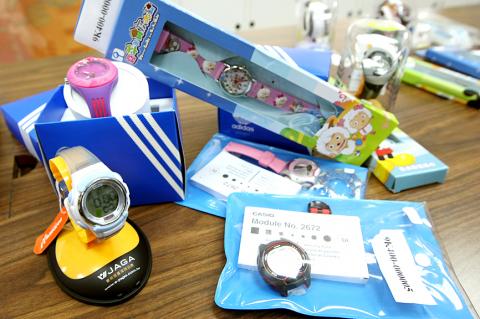About two out of every five children’s plastic watches sold in Taiwan contain an excessive amount of plasticizer that could pose a health risk, the Bureau of Standards, Metrology and Inspection’s (BSMI) latest investigation showed.
The bureau inspected 12 types of children’s watches sold at hypermarkets, toy stores and retail outlets across the country and found that five contained plasticizer at amounts exceeding the legal limits.
The bureau said product safety standards do not allow for plasticizer chemicals making up more than 0.1 percent of product mass, but the substandard plastic watches contained such chemicals in excess of this amount, with one Maxima brand watch containing 20.56 percent of plasticizers by mass.

Photo: CNA
The maker of the Maxima watch was also guilty of other product violations, including not having a proper product label indicating country of origin or the manufacturer’s name and address, and its product labels were not translated into Chinese.
A China-manufactured Casio watch also tested positive for plasticizer chemicals at 1.02 percent on its plastic watchstrap, despite costing NT$700.
BSMI deputy director-general Huang Lai-ho (黃來和) said watches that contain excessive amounts of plasticizers could be dangerous for children, who might put the plastic watchstraps in their mouth.
“Plasticizer chemicals could be absorbed through the skin when children wear the watch or enter the body if they put the watch in their mouths,” Huang said.
Plasticizers, or phthalate esters, contain environmental hormones that act as endocrine disruptors. The substances can potentially damage the liver and kidneys, cause men to develop female traits and increase the risk of breast cancer in women, the bureau said.
The bureau has ordered all substandard watches to be removed from store shelves and called for product improvements to be made, with fines of up to NT$200,000 for those who fail to comply.
It also urged parents to only buy watches that are properly labeled and teach children not to put plastic watches in their mouths.

Alain Robert, known as the "French Spider-Man," praised Alex Honnold as exceptionally well-prepared after the US climber completed a free solo ascent of Taipei 101 yesterday. Robert said Honnold's ascent of the 508m-tall skyscraper in just more than one-and-a-half hours without using safety ropes or equipment was a remarkable achievement. "This is my life," he said in an interview conducted in French, adding that he liked the feeling of being "on the edge of danger." The 63-year-old Frenchman climbed Taipei 101 using ropes in December 2004, taking about four hours to reach the top. On a one-to-10 scale of difficulty, Robert said Taipei 101

Nipah virus infection is to be officially listed as a category 5 notifiable infectious disease in Taiwan in March, while clinical treatment guidelines are being formulated, the Centers for Disease Control (CDC) said yesterday. With Nipah infections being reported in other countries and considering its relatively high fatality rate, the centers on Jan. 16 announced that it would be listed as a notifiable infectious disease to bolster the nation’s systematic early warning system and increase public awareness, the CDC said. Bangladesh reported four fatal cases last year in separate districts, with three linked to raw date palm sap consumption, CDC Epidemic Intelligence

Taiwanese and US defense groups are collaborating to introduce deployable, semi-autonomous manufacturing systems for drones and components in a boost to the nation’s supply chain resilience. Taiwan’s G-Tech Optroelectronics Corp subsidiary GTOC and the US’ Aerkomm Inc on Friday announced an agreement with fellow US-based Firestorm Lab to adopt the latter’s xCell, a technology featuring 3D printers fitted in 6.1m container units. The systems enable aerial platforms and parts to be produced in high volumes from dispersed nodes capable of rapid redeployment, to minimize the risk of enemy strikes and to meet field requirements, they said. Firestorm chief technology officer Ian Muceus said

MORE FALL: An investigation into one of Xi’s key cronies, part of a broader ‘anti-corruption’ drive, indicates that he might have a deep distrust in the military, an expert said China’s latest military purge underscores systemic risks in its shift from collective leadership to sole rule under Chinese President Xi Jinping (習近平), and could disrupt its chain of command and military capabilities, a national security official said yesterday. If decisionmaking within the Chinese Communist Party has become “irrational” under one-man rule, the Taiwan Strait and the regional situation must be approached with extreme caution, given unforeseen risks, they added. The anonymous official made the remarks as China’s Central Military Commission Vice Chairman Zhang Youxia (張又俠) and Joint Staff Department Chief of Staff Liu Zhenli (劉振立) were reportedly being investigated for suspected “serious